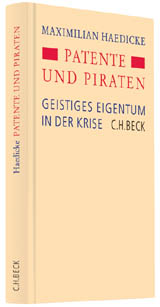Political Turmoil in Germany: Piratenpartei Is Soaring
 As already indicated in my earlier post, one of the mainstream topics of discussions in Germany concerning IP politicts is the stunning rise of the German Piratenpartei (Pirate Party) at least if recent polls can be trusted. As of April 18, 2012, a poll covering the entire territory of Germany attributes to the Piratenpartei a 13% share of the votes. This is remarkable, indeed. According to the same poll, the Greens could expect a 12% share of the votes and, hence, the Piratenpartei might well be called third-strongest political party in Germany. However, we should not forget that such polls usually have a substantial error margin and, hence, the reality might also be that the Greens have 14% and the Piratenpartei merely 11% of the votes. In any case, at least at the time being, the Piratenpartei appear to be well avove 10% and, of course, well ahead of the 5% quorum required to get seats in general elections.
As already indicated in my earlier post, one of the mainstream topics of discussions in Germany concerning IP politicts is the stunning rise of the German Piratenpartei (Pirate Party) at least if recent polls can be trusted. As of April 18, 2012, a poll covering the entire territory of Germany attributes to the Piratenpartei a 13% share of the votes. This is remarkable, indeed. According to the same poll, the Greens could expect a 12% share of the votes and, hence, the Piratenpartei might well be called third-strongest political party in Germany. However, we should not forget that such polls usually have a substantial error margin and, hence, the reality might also be that the Greens have 14% and the Piratenpartei merely 11% of the votes. In any case, at least at the time being, the Piratenpartei appear to be well avove 10% and, of course, well ahead of the 5% quorum required to get seats in general elections.
In view of this situation we can see an increasing level of nervousness – if not outright panickiness – amongst other political parties which are feverishly considering all available options of how to cope with this new political force. It is entirely open to what end this development will lead. Some parties, in particular the Greens, might be mulling to inch towards Pirate positions in order ro regain ground in circles of younger citizens while others surely will prefer to fight agsinst the very tendencies embodied by the Piratenpartei. In this context and speaking to an audience of IP specialists living abroad I would also like to point out that the current political discussion of the Piratenpartei can by no means be reduced to issues related to IP rights. There are other topics, for example in the fields of welfare politics or related to defending civil rights which are of great importance domestically.
 Deep concerns and even panic can not only be seen at political parties but also elsewhere in public life. Take for example one of the most renowned broadsheet papers in Germany, the Handelsblatt. This is a daily mainly covering themes of economic relevance. In their issue dated April 05, 2012, which as made up with a title page pugnaciously chanting “MEIN KOPF GEHÖRT MIR!” (“My head belongs to myself”; see picture on the left) and printing a mixed bag of about one hundred brief text snippets authored by artitsts, politicians, lobbyists and the like, all of them condemning positions accredited to the Piratenpartei concerning alleged tendencies to promote abolition of IP rights. One of the main problems with this politically motivated happening of Handelsblatt surely is, however, that obviously rarely a few of all of the contributors have argued in a way supporting an assumption that the party programme of the Piratenpartei was studied in detail. When reading the Handelsblatt paper, one must come to the conclusion that the hundred contributors dissociate themselves from something like a total abolishment of all IP rights. This is, however, not a valid point in this debate here. Pirates might object to the abstract concept of “intellectual property” but at least the German chapter of the international Pirate Parties movement appears to be quite moderate when it comes to particular proposals to reform copyright, patent and other related laws. They are surely not radical abolitionists of all IP rights. This does not mean that all of these proposals should be considered acceptable; to the contrary, many of them will cause severe headaches in the affected circles of businesses run on IP-based business models. However, it surely is uncandid to presume and also to suggest in an unquestioned manner that the German Piratenpartei currently aims at abolishing all IP rights altogether. The alternative which is to be preferred in my humble opinion is to carefully read Pirate’s demands and to enter into a fact based discussion. It does therefore not come as a surprise that Handelsblatt has been bashed extensively and rightfully by critics especially on Internet social media for pushing this sort of half-baked political orchestration.
Deep concerns and even panic can not only be seen at political parties but also elsewhere in public life. Take for example one of the most renowned broadsheet papers in Germany, the Handelsblatt. This is a daily mainly covering themes of economic relevance. In their issue dated April 05, 2012, which as made up with a title page pugnaciously chanting “MEIN KOPF GEHÖRT MIR!” (“My head belongs to myself”; see picture on the left) and printing a mixed bag of about one hundred brief text snippets authored by artitsts, politicians, lobbyists and the like, all of them condemning positions accredited to the Piratenpartei concerning alleged tendencies to promote abolition of IP rights. One of the main problems with this politically motivated happening of Handelsblatt surely is, however, that obviously rarely a few of all of the contributors have argued in a way supporting an assumption that the party programme of the Piratenpartei was studied in detail. When reading the Handelsblatt paper, one must come to the conclusion that the hundred contributors dissociate themselves from something like a total abolishment of all IP rights. This is, however, not a valid point in this debate here. Pirates might object to the abstract concept of “intellectual property” but at least the German chapter of the international Pirate Parties movement appears to be quite moderate when it comes to particular proposals to reform copyright, patent and other related laws. They are surely not radical abolitionists of all IP rights. This does not mean that all of these proposals should be considered acceptable; to the contrary, many of them will cause severe headaches in the affected circles of businesses run on IP-based business models. However, it surely is uncandid to presume and also to suggest in an unquestioned manner that the German Piratenpartei currently aims at abolishing all IP rights altogether. The alternative which is to be preferred in my humble opinion is to carefully read Pirate’s demands and to enter into a fact based discussion. It does therefore not come as a surprise that Handelsblatt has been bashed extensively and rightfully by critics especially on Internet social media for pushing this sort of half-baked political orchestration.
 As early as November of 2010, Maximilian Haedicke, Law Professor at the Albert-Ludwigs-University in Freiburg, Germany, closed his manuscript of his book “Patente und Piraten – Gestiges Eigentum in der Krise” (Patents and Pirates – The crisis of Intellectual Property) which has been published (in German) by C.H. Beck, Munich. The author studied law in Munich, Geneva and Washington D.C. (LL.M. Georgetown 1995 as Fulbright-Scholar, New York; Bar Exam 1995). In 1997 he prepared his doctoral thesis at the Max-Planck-Institute for Foreign and International Copyright, Patent and Competition Law in Munich on the subject of “Copyright and US International Trade Law and Policy”.He became assistant professor at Max-Planck-Institute for Foreign and International Copyright, Patent and Competition Law in Munich. Afterwards he worked for an international law firm with a specialisation on intellectual property and information technology law, especially in the area of patent litigation. Since fall 2003 he is tenured professor at Albert-Ludwigs-University in Freiburg where he holds a Chair for Intellectual Property and Competition Law. In his small book mentioned above he discusses a broad range of topics in a number of chapters as follows:
As early as November of 2010, Maximilian Haedicke, Law Professor at the Albert-Ludwigs-University in Freiburg, Germany, closed his manuscript of his book “Patente und Piraten – Gestiges Eigentum in der Krise” (Patents and Pirates – The crisis of Intellectual Property) which has been published (in German) by C.H. Beck, Munich. The author studied law in Munich, Geneva and Washington D.C. (LL.M. Georgetown 1995 as Fulbright-Scholar, New York; Bar Exam 1995). In 1997 he prepared his doctoral thesis at the Max-Planck-Institute for Foreign and International Copyright, Patent and Competition Law in Munich on the subject of “Copyright and US International Trade Law and Policy”.He became assistant professor at Max-Planck-Institute for Foreign and International Copyright, Patent and Competition Law in Munich. Afterwards he worked for an international law firm with a specialisation on intellectual property and information technology law, especially in the area of patent litigation. Since fall 2003 he is tenured professor at Albert-Ludwigs-University in Freiburg where he holds a Chair for Intellectual Property and Competition Law. In his small book mentioned above he discusses a broad range of topics in a number of chapters as follows:
- System under fire
- Delusional usage of of cease-and-desist letters and Internet blockers
- Liability of Internet service providers for copyright infringement committed by their customers
- Limitations of creative utilisation of artwork imposed by copyright
- Copy protection and private copies
- Copyright and access to knowledge
- Development options for copyright law
- Software patents – absurdity of patent law?
- Pharmaceutical patents – boon or bane?
- No patents on life?
- Development options for patent law
- Calling the system into question: Why Intellectual Property?
On the one hand, Professor Haedicke ought to be praised for opening a serious debate on the final reason as well as on first principles of Intellectual Property in view of the upcoming Pirate movement as early as in 2010. However, on the other hand, the political development appears to be so rapid that publishing a manuscript in the form of a traditional paper book might look a bit futile. Nevertheless, I think that even today Haedicke’s book is worth a read.
In the first copyright-centered chapters of his book, Haedicke demonstrates by knowledgeably going into many details that he is very well acquainted with this field of law. He discusses numerous problems of copyright and neighbouring/related rights in the digital realm and sounds a note of caution: It probably does not make sense to ever increase the level of IP protection in this field e.g. by introducing a new suis generis sort of auxiliary copyright (“Leistungsschutzrecht”) for the benefit of publishers currently fiercely under debate in Germany.
But when Haedicke comes to patent law, some deficiencies surface. A number of relevant problems in the field of patents, e.g. patents on computer-implemented inventions or pharmaceuticals as well on livestock, patent trolls, essential patents in the context of standardisation, FRAND licensing, problems of royalty stacking etc. pp. are all briefly touched but not brought to definitive and remarkable conclusions..
The concluding chapter gives some hints as to how the future development of IP law could or should be steered but, of course, also there are no definitive answers which could be deemed as final. Haedicke admits that any careful dealing with copyright and patent law should by no means simply aiming at extending the broad range of protection across the board and in an inconsiderate manner already conferred by today’s law.
Despite some limitations, the book of Haedicke surely is an interesting opener for substantial discussions on the future of IP law. And this discussion must be carried on based on a sound factual foundation in order to avoids useless showdown happenings without much substance in future as we have seen in the Handelsblatt case explained above.
Axel H. Horns
German & European Patent, Trade Mark & Design Attorney
The k/s/n/h::law blog
Some of the patent attorneys of the KSNH law firm have joined their efforts to research what is going on in the various branches of IP law and practice in order to keep themselves, their clients as well as interested circles of the public up to date. This blog is intended to present results of such efforts to a wider public.
Blog Archives
- November 2013 (2)
- October 2013 (1)
- September 2013 (1)
- August 2013 (2)
- July 2013 (3)
- June 2013 (5)
- March 2013 (5)
- February 2013 (4)
- January 2013 (5)
- December 2012 (5)
- November 2012 (5)
- July 2012 (5)
- June 2012 (8)
- May 2012 (5)
- April 2012 (3)
- March 2012 (4)
- February 2012 (5)
- January 2012 (6)
- December 2011 (12)
- November 2011 (9)
- October 2011 (9)
- September 2011 (4)
- August 2011 (7)
- July 2011 (4)
- June 2011 (1)
Blog Categories
- business methods (6)
- EPC (7)
- EPO (12)
- EU law (92)
- ACTA (8)
- CJEU (4)
- Comitology (1)
- competition law (2)
- Enforcement (6)
- EU Unified Patent Court (62)
- FTA India (1)
- TFEU (2)
- Trade Marks (5)
- European Patent Law (37)
- German Patent ACt (PatG) (1)
- German patent law (5)
- Germany (6)
- Pirate Party (3)
- International Patent Law (4)
- PCT (2)
- IP politics (10)
- licenses (2)
- Litigation (5)
- Patentability (7)
- Patents (12)
- Piratenpartei (2)
- Software inventions (10)
- Uncategorized (9)
- Unitary Patent (24)
- US Patent Law (4)
Comments
- kelle on Germany: Copyright Protection More Easily Available For Works Of “Applied Arts”
- Time Limits & Deadlines in Draft UPCA RoP: Counting The Days - KSNH Law - Intangible.Me on Wiki Edition of Agreement on Unified Patent Court Agreement (UPCA)
- Time Limits & Deadlines in Draft UPCA RoP: Counting The Days | ksnh::law on Wiki Edition of Agreement on Unified Patent Court Agreement (UPCA)
- Wiki Edition of Agreement on Unified Patent Cou... on Wiki Edition of Agreement on Unified Patent Court Agreement (UPCA)
- European Commission Takes Next Step Towards Legalising Software Patents in Europe | Techrights on EU Commission publishes Proposal of amendend Brussels I Regulation for ensuring Enforcement of UPC Judgements
Blogroll
- 12:01 Tuesday
- America-Israel Patent Law
- Anticipate This!
- AwakenIP
- BlawgIT
- BLOG@IPJUR.COM
- BP/G Radio Intellectual Property Podcast
- Broken Symmetry
- Class 46
- Director's Forum: David Kappos' Public Blog
- Gray on Claims
- I/P UPDATES
- IAM Magazine Blog
- Intellectual Property Intelligence Blog
- IP Asset Maximizer Blog
- IP CloseUp
- IP Dragon
- IP Watch
- IP Watchdog
- IPBIZ
- ipeg
- IPKat
- ITC 337 Law Blog
- Just a Patent Examiner
- K's Law
- MISSION INTANGIBLE
- Patent Baristas
- Patent Circle
- Patent Docs
- Patently Rubbish
- PatentlyO
- Patents Post-Grant
- Reexamination Alert
- SPICY IP
- Tangible IP
- The 271 Patent Blog
- The Intangible Economy
- THE INVENT BLOG®
- Think IP Strategy
- Tufty the Cat
- Visae Patentes
The KSNH blogging landscape


This blog and the German-language sister blog k/s/n/h::jur link to the two popular and privately run blogs IPJur und VisaePatentes and continue their work and mission with a widened scope and under the aegis of our IP law firm.
ksnhlaw on Twitter
- No public Twitter messages.
 KSNH::JUR Feed (german)
KSNH::JUR Feed (german)- Ist Verschlüsselung passé? September 6, 2013Auf verschiedenen Feldern beruflicher Praxis ist dafür zu sorgen, dass Kommunikation vertraulich bleibt. Die trifft beispielsweise für Ärzte zu, aber auch für Anwälte, darunter auch Patentanwälte. Einer der zahlreichen Aspekte, die in diesem Zusammenhang eine Rolle spielen, ist die Technik, um die Vertraulichkeit beruflicher Kommunikation sicherzustellen. Wa […]
- EU-Einheitspatent: Demonstrativer Optimismus und Zahlenmystik allerorten – Naivität oder politische Beeinflussung? June 26, 2013Nach mehreren vergeblichen Anläufen zur Schaffung eines EU-weiten Patentsystems wurde 1973 als Kompromiss das Europäische Patentübereinkommen unterzeichnet, welches unabhängig von der seinerzeit noch EWG genannten Europäischen Union System zur zentralisierten Patenterteilung mit nachgeordnetem Einspruchsverfahren durch das Europäische Patentamt schuf. Wie wi […]
- Moderne Zeiten oder: DPMA und Patentgericht streiten über die elektronische Akte April 25, 2013Bekanntlich hat das Deutsche Patent- und Markenamt (DPMA) im Jahre 2013 mit der rein technischen Fertigstellung der Einrichtungen zur elektronischen Akteneinsicht einen wichtigen Meilenstein seines Überganges von der Papierakte zur “elektronischen Akte” erreicht. Im DPMA werden aber bereits seit dem 01. Juni 2011 Patente, Gebrauchsmuster, Topografien und erg […]
- Gutachten zu Forschung, Innovation und technologischer Leistungsfähigkeit Deutschlands 2013 March 11, 2013Unter dem Datum vom 28. Februar 2013 ist die Bundestags-Drucksache 17/12611 veröffentlicht worden Sie trägt den Titel Unterrichtung durch die Bundesregierung - Gutachten zu Forschung, Innovation und technologischer Leistungsfähigkeit Deutschlands 2013. Die Bundesregierung legt dem Deutschen Bundestag seit dem Jahr 2008 […]
- 3D-Printing: Zum Filesharing von 3D-Modelldaten February 25, 2013In meiner kleinen zuvor angekündigten Reihe über rechtliche Aspekte des 3D Printing komme ich heute auf die Frage zu sprechen, ob die Hersteller von Gerätschaften es hinnehmen müssen, wenn Ersatztreile davon – vom Brillengestell über Smartphone-Gehäuseteile bis hin zu Rastenmähermotor-Abdeckungen – gescannt und die daraus […]
- Ist Verschlüsselung passé? September 6, 2013











